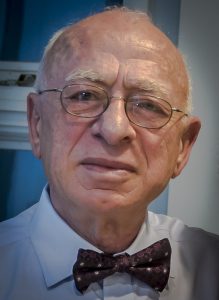 Lev Gilboa is the type of person who tells a story with his whole body.
Lev Gilboa is the type of person who tells a story with his whole body.
He left the Soviet Union on November 2, 1972, having been released from prison and given 72 hours to get out of the country. He went to Israel and eventually came to America in 1974. When he first came to America, he worked for the Voice of America. He now works for Keller-Williams Realty in McLean, Virginia.
Like many Russian Jews, he escaped communism, and relishes his ability to make money for himself. As he tells the stories of his childhood, of political strife and protest, he cannot stay seated.
What’s your immigration story?
I never thought about leaving the Soviet Union. I grew up in a strong Jewish family, full of pride of my Jewishness. I was never chauvinistic about it. We were proud. I don’t even remember hiding my Jewishness, not even in the Soviet Union. In Georgia, we knew who was Jewish and who was Georgian. I decided at some point that I would not live in Georgia, I would live in Russia. My idea was to be writing, at 17 or 18.
What happened?
Until 1967, I was a Soviet patriot. I was a 27-year-old young man, and all of a sudden, in the middle of May, the Russian propaganda machine became anti-Israel. I lived in Moscow, because I worked in the Urals in the north of Moscow. At the end of May, it was nonstop anti-Semitic radio propaganda. The Russians didn’t hide their anti-Semitism. I struck me very deeply that the official Russia parties that I was involved with had anti-Semitic attitudes. It changed my mindset so much that I could not do anything else. I wanted to hear more truth. I could not imagine the insinuation—that Jews were running away from Arabs, that Arabs were conquering. Israel was doing this and Russia was announcing it would suppress Jewish patriotism. Jews were running away—they were cowards, they were conquered and then during the Six-Day War we found out the truth.
How did you react?
I wrote a letter to President Podgorny saying that, because you encourage Palestinian terrorists, you pay them, you educate them, you teach them the tricks. You’re teaching them terrorism, and you pay them my taxes for the weapons that they used to kill my brothers. I refused to be a Soviet citizen. The letter was 70 lines. I refused to be your citizen, I signed, I’m not subject of your laws anymore.
I went to the post office to mail it. I was going to buy an envelope, and I see one Jew, another Jew. In Russia, you can notice Jews.You can recognize them. I approach him, we try to exchange news with each other. We had contacts within the entire Western world. Around 6:30, we were so involved in the information that we got that I forgot to send this letter. We decided to put Magen David on our left arms, and we walked as a demonstration. Nine people. Nine Jews. We tried to protest around Gorky Street, along Red Square. All of this is across from the Kremlin. We were elated, we were excited. Fighting for your freedom is so exciting, I cannot describe to you. You are ready to do anything for your freedom. You become free, you become inspirational to others.
We were Jewish heroes, new Maccabeans. We didn’t call ourselves that, but we knew we were fighting for our freedom for emigration. In half an hour, KGB came, and they put the nine of us into two black cars. They pushed us, they took us to the police station. They stopped us and ordered us to take everything from our pockets. That night, they put us in a cell, a dark cell with one lightbulb, and we woke up the next morning, and they put us in front of a judge. They told us we were hoodlums, we were disturbing order. We had to stay in jail for ten days. After the court, they took us to another court. A notorious jail, Matryoshka Astashkina, in north of Moscow. They put me in a box and shoved me inside, to break me, to break my friends. After half an hour, they came out, pulled me out, and my friends too. They took me down, deep in the ground to a cell with an open, broken window. It was cold already. I stayed there for ten days. They brought food. I didn’t eat. I went on a hunger strike.
Have you been back to Russia since?
I went to Russia about 14 years ago. I’m glad I went. I didn’t intend to go back. It’s better without communists. Now I see with Putin that there’s no real freedom there, they’re killing opposition leaders. How they hold themselves, it’s amazing. Russia is 11 hours from the western border to Kamchatka. They don’t have seas. All the seas there are, they conquered those countries. Georgia, Crimea, Ukraine. Baltic sea. It’s not Russia, the Russians have only their own ice area, close to Norway. But to function normally, you need to have a fleet, a communist relationship. If your ports are frozen—Baltic, Caspian—it’s not theirs.
How do you feel about the U.S. government today?
I would not be lying. I believe that this candidate was much better than the Democratic candidate, because I didn’t like Hillary Clinton. We didn’t have the best choices in the existing political situation. I feel that businessmen would be good, but Donald Trump turns out to be very strange. He was a streetfighter in New York City. I have pictures, by the way—I met him 13 years ago at his own house in Florida. All Russians love him. Because we didn’t like Obama. We ran away from socialism. He made this country socialistic with his healthcare reform.

